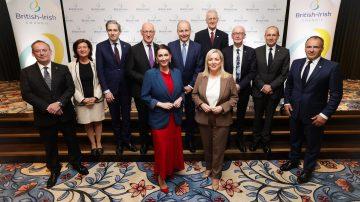Financing a circular economy, balanced regulation and adaptation finance came out as strong themes from Guernsey’s discussions at the COP28 conference.
The start of December saw four Guernsey Finance representatives, Chief Executive Rupert Pleasant, Head of Strategy and Sustainable Finance Stephanie Glover, Communications Director Rosie Allsopp and Middle East Representative Aaron Russell-Davison, who is based in the region, attend the conference in Dubai.
The delegation, alongside representatives of the States of Guernsey and Guernsey’s regulator, the Guernsey Financial Services Commission (GFSC), explored the nuances of Guernsey’s circular economy for the financial services sector, the importance of balanced regulation to support environmental actions, and adaptation finance to deal with the effects of climate change already being felt across the globe.
A further event saw a group of Guernsey’s sustainability leaders joining forces for a panel session on Guernsey’s pioneering waste strategy and wider circular economy model at the Island of Hope event. During the panel, Stephanie highlighted how the sustainable finance industry is understanding the need to move away from a take, make, dispose economy, and instead move towards mechanisms such as sustainability-linked bonds and private finance investment into a circular economy.
On how to help the financial services industry to embrace the circular economy, Stephanie said: “We see large banks and private equity firms looking for investible projects. It’s about helping small scale projects scale up and become investible opportunities for private investment.
“I think financial services businesses should band behind clear regulation and reporting requirements within the circular economy; without these key requirements there is a fundamental risk of greenwashing.”
William Mason, Director General of the GFSC, echoed this sentiment while discussing the importance of balanced regulation to support and implement environmental benefits and actions in a fireside chat with Rosie.
He said: “The International Sustainability Standard Board has set standards which were published in June this year which have done an amazing job of pulling together a complete alphabet soup of standards into one global minimum baseline.”
He saw that global regulators should think in terms of productive investment rather than setting parameters so narrowly that people can’t actually invest into projects which will help to reach net zero. For example, small to medium enterprises, which William said do much of the innovation in the world, need appropriate regulations to encourage them to invest more sustainably without making it so burdensome that they can’t cope with the administration.
William then sat alongside sustainable finance figureheads at The World Climate Summit on 8 December in a panel focusing on investments for the transition to a 1.5C resilient future.
This also marks the first year that the Paris Agreement, an international treaty on climate change, has been formally extended to Guernsey. The extension of the Paris Agreement to Guernsey reaffirms the island’s commitment to be part of the global action to pursue efforts to limit global temperature rises to 1.5C. This means that Guernsey’s emissions will be reported under the UK’s Nationally Determined Contribution, which contains information on targets, policies and measures for reducing national emissions.
After attending many sessions during the conference, Stephanie concluded: “One of my main takeaways from the conference is that adaptation finance is the new growing subsector within sustainable finance. With corporations and countries now experiencing climate impacts first-hand, adaptation financing presents a massive potential opportunity as so much growth is needed to meet the necessary adaptations.
“I think there is a general need to support the scaling up and availability of bankable and investable opportunities in the sustainable finance space. A good pipeline of renewables and sustainable infrastructure continues – echoing the recent renewables and infrastructure fund launches we have recently seen in Guernsey – but there is still a growing appetite for more bankable projects in the adaption and nature finance spaces.
“COP28 was a great opportunity for Guernsey to really spread the message of our sustainable finance successes and learnings, as well as collaborating on a global scale with other leaders in this space.”
Pictured: Left to right – Peter Barnes, Head of Energy & Climate Change at the States of Guernsey, Deputy Lindsay de Sausmarez, President of Guernsey’s Committee for the Environment & Infrastructure, Guernsey Finance Communications Director Rosie Allsopp, and Guernsey Finance Head of Strategy and Sustainable Finance Stephanie Glover.














